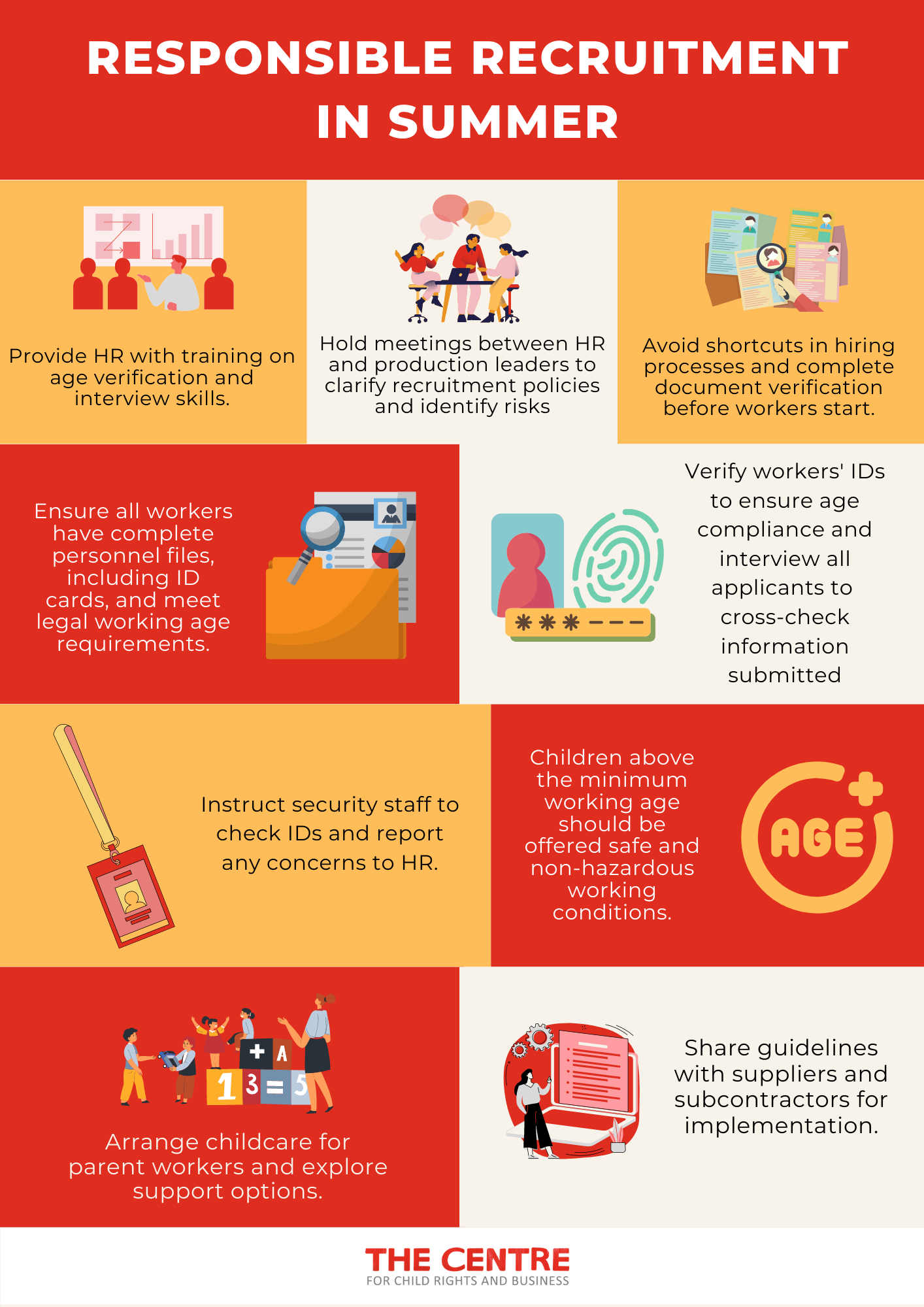

Improving Your Summer Hiring: Embrace Responsible Recruitment Practices from the Start
With summer here, many factories are ramping up their workforce to meet the demands of the peak season. This period also presents an opportunity for young workers to gain valuable experience through internships. However, it is crucial to address potential risks and ensure responsible recruitment practices. The Centre has compiled a concise guide outlining key legislation, potential risks, and measures you can take to mitigate them.
Why is this important?
During the summer vacation, many children, particularly students who are below the minimum working age, actively seek job opportunities. Some of them resort to using fake or borrowed ID cards or find ways to bypass formal recruitment procedures through connections with other factory workers. There are also cases where children who are above the minimum working age but under 18 use fake ID cards to work as adult employees in factories that refuse to hire individuals under 18. In situations where parents work in factories, especially in the case of left-behind children, they may bring their children to the workplace when suitable childcare options are unavailable during the summer break.
The risk of child labour or the employment of undocumented juvenile workers increases when labour agencies hire large numbers of temporary or dispatched workers without implementing proper controls. Additionally, subcontracting poses an additional risk, especially in roles such as canteen work, security staff, and cleaning staff, which require careful attention to ensure compliance with relevant legislation.
Lastly, there is a risk associated with employing student workers, primarily related to non-compliance with local legislation regarding their employment. It is important to note that each country has its own set of regulations governing student workers.
Understanding Local and International Labour Laws
It is important for businesses to be aware of the definition of juvenile (young) workers within the context of both local and international labour laws*. In most cases, individuals under the age of 18 are considered minors and are entitled to special protections in the workplace. These protections include safeguards such as restrictions on hazardous work**, no overtime or night shifts, and mandatory health check-ups.
Actions to take
Ensure all workers, including temporary, dispatched, canteen, security, cleaning, construction, and other staff on factory premises, have complete personnel files, including copies of ID cards, and meet legal working age requirements.
Provide refresher training to HR staff on age verification, including ID card identification and interview skills.
Conduct meetings between HR staff and production leaders to communicate recruitment policies, clarify roles, and identify potential risks. All hiring processes should go through the HR department.
Emphasise that there are no workarounds, such as probation work before hiring. Complete document verification, hiring procedures and orientation training before workers start their positions.
Verify workers' IDs even they are hired via labour agencies, dispatching companies, and schools to ensure applicants are above min. working age. Maintain complete and updated personnel files.
Young workers above the minimum working age should be provided with safe and non-hazardous working conditions, free from discriminatory hiring practices.
Young workers who are above the minimum working age should be offered safe and non-hazardous working conditions, without discrimination against their hiring.
Instruct security staff to record and check the IDs of all visitors. If security staff encounters children, including young workers or individuals who appear to be underage, they should immediately contact the HR department. Security staff should then safely escort the children away from the manufacturing areas, ensuring that they maintain a respectful attitude throughout the process.
If parent workers bring their children due to a lack of childcare, arrange for staff to care for the children in a safe place. Explore options like contacting local childcare centres, setting up a child-friendly space, or offering flexible working hours for parents.
Share these guidelines with suppliers and subcontractors, emphasising the importance of their implementation.
*The Labour Law prohibits an employer from recruiting minors under the age of 14 in Bangladesh & Myanmar, under the age of 15 in Vietnam, Indonesia, Thailand and Laos, and under the age of 16 in China.
**According to the International Labour Organisation (ILO) Article 199 (No.190), the worst forms of child labour involve:
a) work which exposes children to physical, psychological or sexual abuse;
(b) work underground, under water, at dangerous heights or in confined spaces;
(c) work with dangerous machinery, equipment and tools, or which involves the manual handling or transport of heavy loads;
(d) work in an unhealthy environment which may, for example, expose children to hazardous substances, agents or processes, or to temperatures, noise levels, or vibrations damaging to their health;
(e) work under particularly difficult conditions such as work for long hours or during the night or work where the child is unreasonably confined to the premises of the employer.
2025/12/16
Webinar: Addressing Child Labour in Complex Upstream Supply Chains: Agriculture, Mining and TextilesBy using this website, you agree to our use of cookies. We use cookies to provide you with a great experience and to help our website run effectively.